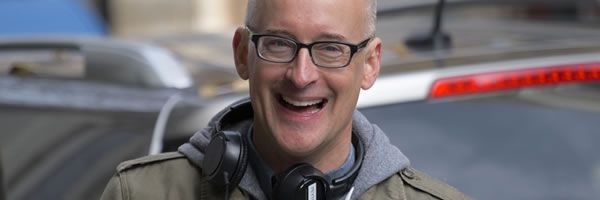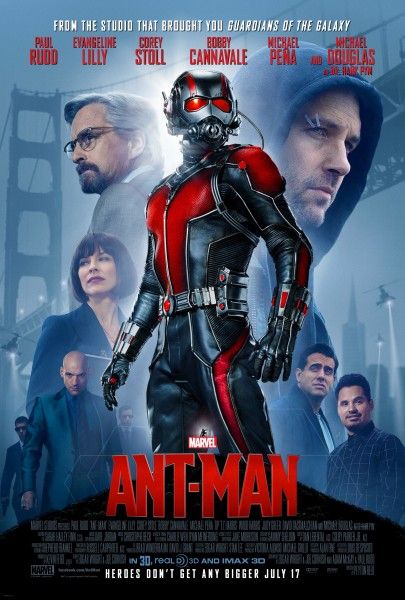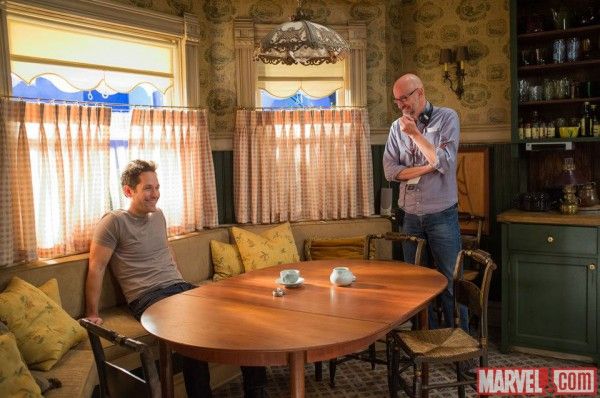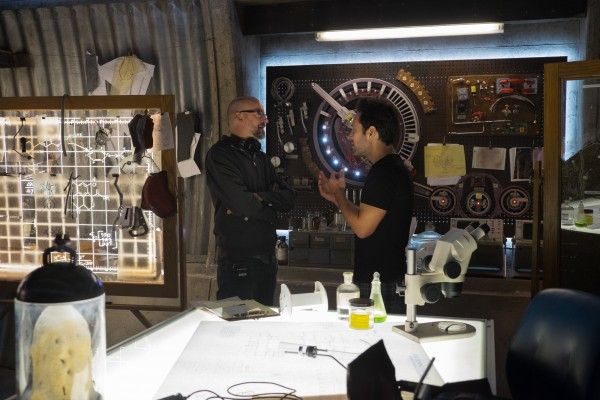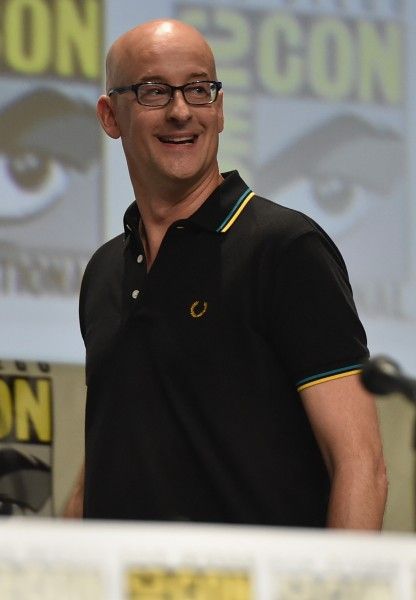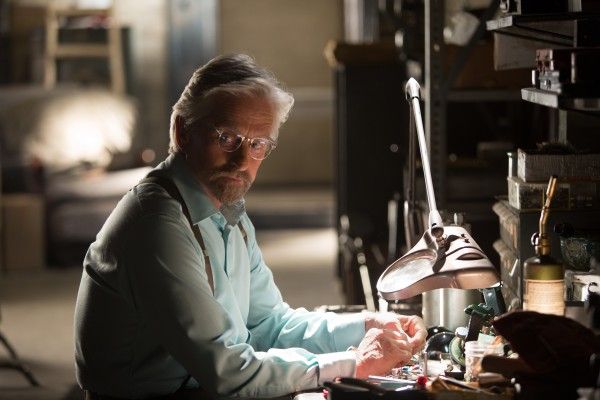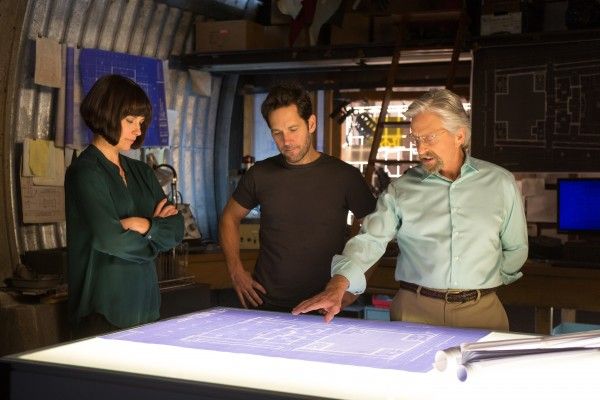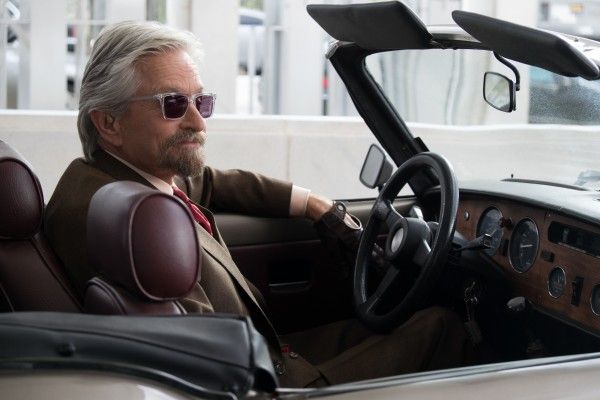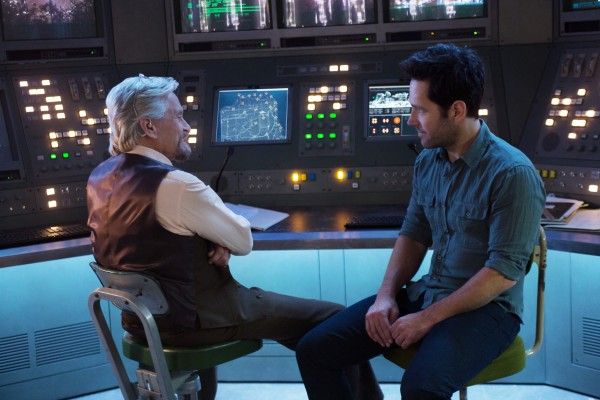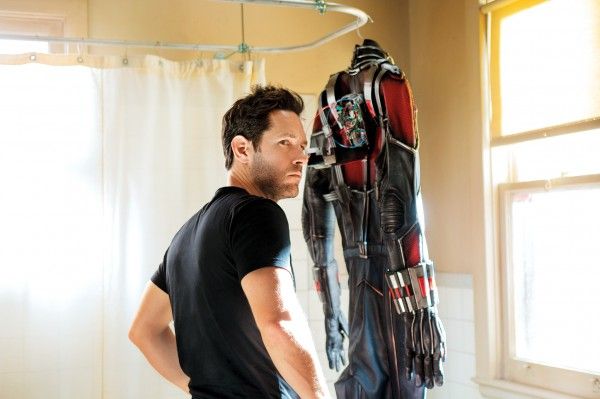When Marvel was hunting for a replacement director after Edgar Wright left the project, I was glad they landed on Peyton Reed. While Wright’s vision will always be a fascinating “What if?”, I really enjoyed Reed’s previous films, Bring It On and Down with Love. He clearly knew how to make a fun movie, but he had his work cut out for him on Ant-Man by having to replace another director. Thankfully, he was more than willing to talk about it when other movie journalists and I visited the set last year.
During our conversation, we also talked about how superhero movies have changed since he tried to get Fantastic Four made a decade ago, the familial aspect of the story, the film’s “tomfoolery”, character relationships, the shrinking effects, ant-wrangling, and so much more. It’s a great interview with a guy who has a good sense of humor and what he wanted to do with this movie. Check out the full interview below.
Is this the first time that the audience has seen Yellowjacket, is it also the first time that [Paul] Rudd has seen Yellowjacket?
PEYTON REED: What we’re shooting right now, yes. It’s the first time that they’ve seen the actual full-scale Yellowjacket in use. So, yeah, it’s a big moment. Did you guys watch it, is it on the monitors?
Yes, we got to see it.
REED: Yeah, that’s sort of the big first reveal of the Yellowjacket.
Darren Cross, he has Cross Tech Enterprises in the comics, does that factor in here as well? I mean, in previous movies we’ve seen these high-tech companies, AIM, Stark Industries, does Pym have his own company or is he like an inventor in his own thing, where does he break out?
REED: Well, right now he’s sort of –Pym Tech still exists, but Hank is not as much as part of Pym Tech as he would like so he’s a little on the outside. And as far as CTE, as far a Cross Tech, our movie does deal with that.
Are there any mentions of the other tech companies that we have seen in the MCU?
REED: Yeah, there are definitely mentions of Stark, we obviously don’t get to Oscorp or anything like that, but it’s really just that other one, it’s really just Stark.
With Adam Mckay coming on to do writing, Paul Rudd doing writing, with your background in comedy, it’s seems that on the surface this evidently mean funny. What is the tone of it, how funny is the movie intended to be?
REED: Well the thing about McKay is that you know him from SNL and the movies and stuff and as the comedy guy, but he is actually a huge Marvel guy, which I did not know until we started this process, he gets that universe. So to me the plus of McKay was not only the comedy but structural stuff and conceptual stuff that he added, that he brought that was fantastic, so for me that was a huge bonus. And I think in terms of the portion of comedy and action, I mean, it is a Marvel movie, no question, in all the sort molds of really grounding it and finding humor in it. That’s always been important, finding the truth in the moment and the humor in the moment, so would you define it as a comedy? I personally would not call it an action/comedy, it’s a Marvel movie, but they’re not joking it up in a way that it’s like jokes, it’s situations.
It’s not spoofing.
REED: No.
When we were talking to Kevin Feige earlier he said that you guys have a relationship that goes back many, many years. What was your sell on this film and on the job?
REED: It’s obviously very well documented, the drama that precedes the movie, but I went in and I hadn’t seen any materials, I hadn’t read a script or anything and I went in to meet with the guys and read the different drafts of the thing and then saw some of the early visualizations of what it was gonna be, and they blew me away, just the stuff that had been done on the movie. When I read the different drafts I definitely had a strong point of view on what I felt worked really, really well and what I felt didn’t work so well, and then I also kind of brought to it my own personal relationship with the comics, my relationship reading the comic all those years, and how I felt about Hank Pym, how I felt about Scott Lang and I wanted to bring those to the movie.
So we had a lot of conversations sort of about tone and about structure, and at that point I just felt it happened very suddenly so I just had this feeling of, ‘Listen, this is the version of these things that I wanna do and if you’re not interested you’re not interested, it’s no skin off anybody’s back’ but I think we were very much in sync on how we wanted to treat that character. Obviously there was a lot of fantastic conceptual stuff that was there and character stuff that was there, but for me a lot of it just needed to be moved in a different direction, a lot of it just needed to bring it into sync with what’s currently going on in the Marvel cinematic universe. But also like just tonally I had some things I wanted to do.
How much of what Edgar Wright did is in this film?
REED: First of all, script-wise the stuff that Edgar and Joe [Cornish] did, that’s the spine of the movie, it’s a heist movie and it is sort of the passing of the torch from Hank to Scott, and this just kind of bent mentor/pupil story; but the treatment of it tonally, I think is one of the things that changed. In terms of the visualization, there are obviously months and months of stuff done in terms of costume design and stuff, but there’s a real openness, as far as I felt coming in, to change stuff, like in the costume we made tweaks and stuff with just the triggers and that sort of stuff.
One of my biggest concerns coming in on such short notice was, ‘How much am I gonna be able to sort of put myself in the movie?’ and I’ve been really pleased with the process, I’ve never felt as supported on a movie, It’s amazing. And the system is amazing because you can float an idea on a Monday and by that afternoon sit with the storyboard artist and sketch it out, and then all talk about it and revise it, it’s insane to me how quickly that can happen, that you can try something to see if the concept works, you can try an idea to see if it works in two dimensions and even three dimensions, and there’s a real liberty to that.
One of the things I find really exciting about his picture is that you’re trying things that we really have not seen in a movie before, and to see the macro scenes, how you guys are shooting it, they’re not visually animated in a way that anybody would expect. So for you to get to invent new action language seems like a real opportunity as a filmmaker, how do you go about that?
REED: That was one of the things that when I first met I was really sort of animate about, what you don’t want to do is a movie that’s sort if in the –the exciting thing about the movie is it’s the real world and you’re experiencing it from radically different perspectives, and the bad version of that movie is you’re in the real world and when you shrink you’re kind of in a more sort of Pixar CG animated thing, yeah I was really animate about like, ‘Yeah it’s gotta be typed out, it’s gotta be real, and we gotta figure out ways to sort of move around those environments’ The macro photography is crucial, because we’re using these Frazier lenses and these small skater-cam things that you’re able to get un these places, then we’re doing all this digital tiling of real surfaces.
So the lighting, there were a lot of discussions about how when you’re shrunk what’s the light playing like? Like, ‘This light above me is lighting this area, if I’m this small it’s like a giant’ all these discussions of how light and sound and movement change, and it was really important to kind of discuss that endlessly, and we still discuss it as we set up every shot in terms of scale. Because you can sit with a storyboard artist and board something that’s the size of a person and then put an accrual lens on it and it just doesn’t work, you have to like scale, it has to be figured out for every single shot made, and that’s fun but it’s an insane amount of calculation.
How complicated is that when it comes to shooting action sequences? With everything you’re saying, does that create retractions in the action, almost?
REED: No, I think at first it was like, ‘is it gonna create restrictions?’ but the amazing thing about this visual effects system is that there’s a real liberty to it, you can kind of move the camera and do stuff however you want to do it. The main thing for me for these live-action portions with the actors is making sure they’re focused on the right thing and keeping that sort of life and immediacy to the performances, because that’s the thing about a movie like this, it’s I think that there’s some much type of stuff going on that the life could get drained out. The actors that we have on this movie are just insane, I mean, they’re just the best.
With Guardians of the Galaxy we looked at a lot of internet stories a few years ago and they were mentioning the talking raccoon and the living tree and everyone was like, ‘That’s never gonna work’ and obviously they turned into the biggest characters of the year. You have similarities with the ants, like, ‘How is this gonna work out, how are these gonna be characters?' How are you approaching having those characters ending up being cool?
REED: Well I really like the idea that anybody who walked into a movie theater lobby could see a print of Ant-Man, it could be Paul riding an ant or whatever, and say, ‘Well that looks ridiculous. How’s Ant-Man gonna be cool?’ and this movie answering in a very definitive way how it can be cool, I like that. I mean, I don’t really know that that’s the situation but to me there is an underdog feeling about the movie, for me personally just for coming in as late as I did but also because it’s Ant-Man, and I love that because as a filmmaker you maybe tend to only get one chance to be an underdog, maybe your first movie, and it either does well or it doesn’t and you kind of don’t have that position anymore.
But I like the idea on this that the expectations are sort of, ‘What is it?’ I mean, the shrinking thing is one thing and kind of the most obvious Ant-Man power, but the controlling of the ants is the weirder power and kind of the one that I’m more into in a weird way, because it’s like with that you have the sort of freedom to create these situation and this sort of army of ants and see how something so small can be mobilized as an actual really formidable thing.
Is that something that you had a clear vision on, you wanted to make sure you got that before you got into any of these other elements?
REED: Well that element I think is something that was always a part of Ant-Man, but it’s tonally tricky in terms of like part of this initial photography we did. In macro photography we’re shooting live ants and lighting them from behind and really creating tactile ants because you don’t wanna have a compelling story then you dwell into that world and suddenly be in Antz or something.
[All Laugh]
I think A Bug’s Life is better.
REED: Yeah, I love A Bug’s Life. So yeah, tonally that’s the thing, sort of like the tone of those ants, making them real and compelling and not cutesy-poo on the other end and really like, ‘Oh wow! That’s awesome!’
Are you using real ants then, for some of the shots?
REED: We used real ants mostly for reference and we used ants for focus marks and stuff like that just to sort of see how the light in environment, but the bulk of it will be all created.
So you have like an ants wrangler on set?
REED: That’s Ant-Man!
You’re a nerd and…
REED: Thank you.
Are those in the Michael Douglas exposition scenes?
REED: Yeah, with Michael, yeah. And it’s an amazing thing to kind of have a line that would sort of feel like a Marvel comics line [does Michael Doulas impression] and hearing it come out of Michael Douglas…
[All laugh]
REED: I’d believe the science of that, I’d believe it. And then having Michael on set like, [does Michael Douglas impression] ‘What the fuck?’
[All laugh]
It’s amazing. But his voice is just like this national treasure, man, it’s amazing.
What were the pluses and minuses of stepping into a film where the cast is already in place? Where that’s not part of your job anymore, what is that like?
REED: Well that’s the thing, I mean, for a director the cast is such a huge part of the job so my answer to that would be like, in a different situation, it’s like, ‘Well, hope these guys had enough input’ Luckily, Marvel and Edgar cast amazing actors, I mean, we’ve cast additional actors since then but the core group are just beautifully cast. To me Hank Pym is one of the most compelling characters in the Marvel comics world, and to have Michael Douglas play that guy where there’s just clearly a huge gray area with this guy and sometimes with that character you wonder if he’s sane, that’s perfect casting to me, I think he’s fantastic. And that’s been a great joy of the movie, seeing Michael and Paul work together, they work as a group, so I am the very fortunate beneficiary of really great casting choices.
How did the Guardians of the Galaxy soundtrack change making Ant-Man?
REED: I don’t know that it really had an effect on Ant-Man, for me. I mean, I loved the soundtrack for Guardians, but I don’t think you can come out and do that again, even if you wanted to. So we’re doing it all out of Indiana’s score.
[All laugh]
You were talking about Hank Pym being one of the most fantastic characters in the Marvel universe, you can definitely agree he’s also one of the most controversial characters. I know obviously you’re not going to delve into certain aspects of his past life, how would you let that darkness come out on screen, how much of his past are we going to see?
REED: I think you’ll see a really conflicted character and a character in this movie who needs to sort of make right a lot of stuff in his life, and I think there’s a certain amount of guilt that motivates him.
We’ve been hearing about this kind of familial aspect of the movie, the relationships between fathers and daughters, things like that. How does that play into this movie? Because that’s sort of a rare thing in Marvel movies.
REED: Well yeah, that was another kind of compelling thing to me when I first read the scripts, is that here’s a hero in the Marvel universe that’s a parent, and that’s something we haven’t seen and, again, something that if dealt with in the wrong way can be tricky. But the way I feel that we’re dealing with it in the movie is really great and is a crucial part of the Scott Lang story, and I like that because there is kind of a weird sort of domestic component to the movie, it’s very different than the other aspects of the movie.
We got a boy scout, a popular rich kid, the jock, the outlaw, where does Scott Lang really fit in, what does he bring that’s different?
REED: Well Scott is a guy, again, who’s made some really, really terrible choices in his life, and he’s a guy, I think, who gets adrenalized at the idea of a heist or a job or something like that, so he’s conflicted about that, and it’s led him to make some terrible life choices that he’s trying to change and kind of struggling to stay on the straight narrow. So, again, I like the idea that he’s sort of a conflicted person and also that he doesn’t even have super powers, it’s the suit, it’s the part of the technology, and he’s very, very reluctantly pulled into this situation.
You talked about the film being a heist film, with Guardians there are some nods to Indiana Jones and Star Wars, and then you had Bourne Identity sort of popping around in Captain America. Where there any particular films in the heist genre that influenced you at all when you were making the film?
REED: Yeah, I mean, it’s more about the rhythms, it’s more about the rhythms of a heist movie, so I can’t really point to one specific heist movie, though I love heist movies. But I don’t there one that this specifically owes to, which I like, but the rhythms of the movie, particularly the second half of the movie, in all the machinations of that, it’s very much sort of the structure of a heist movie. But yeah, there’s not really one I would point to.
There’s talk these days of a lack of female superheroes in movies, and Ant-Man has as part of his larger world one of the most iconic female superheroes in Wasp, not only the founder of the Avengers but eventually the leader of the Avengers. If you can you tell us, what is the female component of this movie and are we gonna see Wasp on screen?
REED: I think there are really compelling female components in the movie and working with Evangeline [Lilly], I mean, Evangeline is someone who just rises above in this movie, and she shows a lot of cards in this movie, and I think the movie is as much her journey as it is Scott Lang’s journey in the movie. As far as Wasp, we’re definitely dealing with Wasp in the movie, I don’t know how much Kevin Feige told you.
Kevin told us we were gonna see her in a flashback and we were gonna see her eyes through a mask.
REED: You’re gonna see her in a flashback and you’ll see her eyes through a mask.
[All laugh]
Most of the movie is set in the modern world, but there are gonna be flashbacks, particularly about characters that we don’t know much about yet. I’m curious if you could talk about building that era and also that Michael Douglas is playing the younger version in the film?
REED: Yeah, and again, that’s fun to me too because, again, one of the great joys if the Marvel comics universe is sort of the different eras and how heroes would sort of change, adapt, and that sort of stuff. So I think that’s one of the fun things, is to see at least a couple of situations in this movie that warp back to this other era that we haven’t really dealt with. There are two specifically, two different eras, and I love it aesthetically just because of what you get to do with the suits and the type of actions, but it’s also really –Pym is a guy that’s really haunted by his past so it’s a crucial part of the movie to sort of make that come alive.
Are there multiple flashbacks?
REED: Multiple probably suggests that there’s contact fracture of time and going back, I wouldn’t say that.
Are you doing anything to Michael to digitally age him down, like back?
REED: Yeah, for a sequence of so, yes, definitely.
We know in the Marvel universe that it’s all connected, but with Agent Carter coming out is there an opportunity there to have a crossover between Pym’s history with S.H.I.E.L.D.?
REED: Yeah, yeah, I actually don’t know what specific plans they have for the series for her, I don’t have the answer to that, that would be a Feige question.
But how does he deal with her?
REED: We elaborate on Hanks feelings about S.H.I.E.L.D. and possible history there.
With the other solo Marvel movies they all seem to expand on a certain area in the cinematic universe, Captain America 2 expands on S.H.I.E.L.D., Thor expands on Asgard, Guardians takes us to space, what area is Ant-Man going to expand on that we haven’t really seen in anything else?
REED: Well I thinks it’s the Pym story, I mean, to me growing up in the late ‘60s/early ‘70s reading the comics I thought he’s a character to me that’s one of the defining characters in the Marvel universe. So that’s what I think that this is exploring, this whole other sort of thing and in this movie you don’t quite know how it’s connected to the larger universe until you get to the end.
Is there a chance we will see the Big House?
REED: A chance, there’s always a chance.
How are you visually going to show the actual shrinking?
REED: We show it and we demonstrate it in a lot of different ways in the movie. You mean visual effects wise, the actual transition, or once they’re shrunk?
The actual transition.
REED: Well, again, there’s sort of different styles of shrinking, but one of the things that I like is that it’s very quick, it’s not a –you won’t see any shrinking.
Is it the same with getting the suits on? Because I noticed it’s quick that he’s outside the helicopter and then he comes back in and he’s Yellowjacket.
REED: Yeah, there’s stuff that goes on between those shots that there’s a little bit of passage of time.
Is it easy for him to just become Yellowjacket, is there like a briefcase that he just opens up?
REED: It’s a process, I’ll say that.
This is the first character where really greatness is thrust upon them, how are you gonna explore that between the characters?
REED: Well yeah, it really is, and this has probably been said before, sort of this parallel story of these guys who sort of have their daughters and they have made some choices in their lives that have not been good and try to sort of find redemption. And it’s gonna be a very ponderous, slow movie, family drama.
[All laugh]
You and Kevin have worked together before on Fantastic 4, how did your relationship change and stay the same when you guys came back together for this one?
REED: Well, I think the world is really different in terms of comic book movies. We were working together right after, really just as the first [Sam] Raimi Spider-Man was coming out, this was 2003, and also Marvel was not sort of the Marvel it is now so it was Marvel at Fox so you had to deal with Tom Rothman and other people. And clearly Marvel didn’t have the freedom to do the stuff that they’re doing now, which is a shame, and I actually don’t know much about the Fantastic 4 movie that’s going on now, I hope it’s great because I’m a massive Fantastic 4 fan and that to me was always sort of the crown jewel at Marvel that needs to be done right.
Can you talk about how the period has changed and how superhero ideas are accepted now in a way they weren’t about a decade ago?
REED: First of all I would say the current Marvel you could float an idea like that and actually it would be entertained and discussed and how we can make that work, at Fox at the time the notion of doing a period Fantastic 4 was just like, ‘No, we’re not doing it’ but the other thing was at the time the idea of the Fantastic 4 were what we called “day-time superheroes”, they didn’t have secret identities they were very much part of the fabric of Manhattan and that was really thrilling to us at the time.
But I like the idea of potentially exploring different periods of Marvel heroes, again, I truly don’t know what the current take on Fantastic 4 is, if anybody knows…
Nobody knows.
REED: So, I didn’t answer your question at all.
Just it does feel like the world as we see it right now with the Marvel universe, they couldn’t deal with the fact they had alien invasion, they have Iron Man running around, Gods on earth, things like that, so that’s the world. But Pym when he was a spy, that was not the world that he got involved with, it was a different era.
REED: Yeah, exactly, and that is interesting. That part of the story is an interesting part to me because it’s kind of uncharted territory in the Marvel cinematic universe, so that’s appealing and I just in the largest sense hope that they start to tackle more of that type with all the characters with different eras.
Is there time for tomfoolery in this, will we see Scott Lang just in his house?
REED: “No time for tomfoolery Scott, we’ve gotta…”
[All Laugh]
REED: Oh yeah, there’s always time for some tomfoolery. To me that’s the thing that the Marvel movies have done so well, to me they’ve reached a point where there is a cinematic equivalent of that Marvel comic sense of humor. There were lots of different types of senses of humor in the Marvel universe in the comics, but they also held together as this one coherent thing, and it’s something that I think we kind of take for granted now with Marvel movies but it’s a huge fucking accomplishment. I mean, it just like if you think back to the first Spider-Man or the first X-Men it’s like, ‘Wow people are taking superhero movies—it was a revelation that they were being halfway taken seriously’ but that’s what’s exciting is, for me personally, to be working in that environment, I don’t know what other people say according to the environment but I find it to be like a really crazily, curious, creative environment in which to work.
Sitting with Jake Morrison, who’s the effects head on the movie, coming up with stuff there’s like an enthusiasm, ‘Oh yeah, let’s try that!’ and this constant thing with like, let’s try something that we haven’t seen. I feel like for the first time it’s producers and creative people thinking the way that I would say I would think as a fan, like, ‘Oh, if I worked there I would do this and try this and why not? Because there’s a million other movies like this so let’s try that’ Guardians is an example to me of –because I actually went and pitched on Guardians, and at the time you’re sitting there talking about a talking raccoon and a tree and like, ‘How are you gonna do it?’ and that was a swing for the fences, that could have gone off the rails so quickly, now it’s sort of done what it did and it’s, again, I think people take it for granted. But it was never a hugely popular comic to begin with and I think it was like, ‘Oh what if people are getting into superheroes fatigue? Let’s make a space opera’
Because of the success of Guardians of the Galaxy, is there a positive effect, because the incentive is that Marvel could do anything right now. Do you see that as encouragement or does it add a responsibility almost?
REED: There’s always the responsibility and pressure, I mean, no one wants to make a bad movie, you want to make a great movie and I think, to me, what I’ve witnessed at Marvel and I think with Kevin personally, is I’m sure he enjoyed the success of Guardians, but Kevin was just on to the next thing and this and attacking this thing, and again, I like that because there’s this hunger about not repeating yourself and trying different stuff and, ‘Hey, we’ve had success, let’s use that to try some other weird different things’ like I think Phase 3 is going to embrace the weirdness, which I like.
Ant-Man opens July 17th. For more of out set visit coverage, click on the links below:
- ANT-MAN Set Visit: 106 Things to Know about Marvel’s Big Tiny Superhero
- ANT-MAN Set Visit: Paul Rudd Talks Suiting Up, Rewrites, and More
- ANT-MAN Set Visit: Kevin Feige Talks Expanding Mythology and More
- ANT-MAN Set Visit: Evangeline Lilly Talks Ambiguity, Script Changes, and More
- ANT-MAN Set Visit: Michael Douglas Talks Finally Being Cool and More

